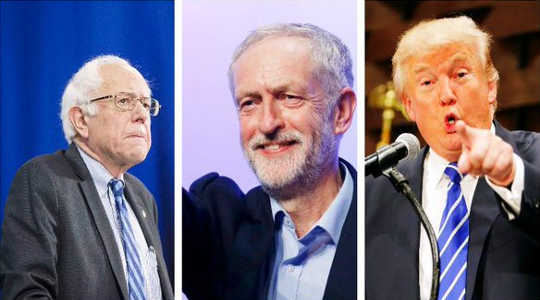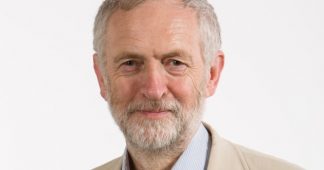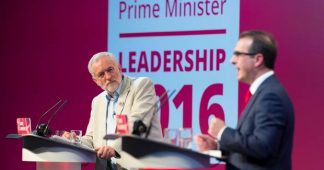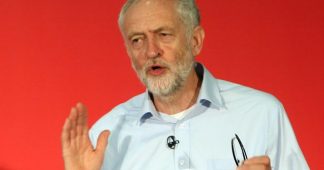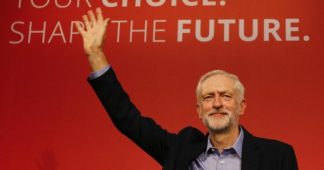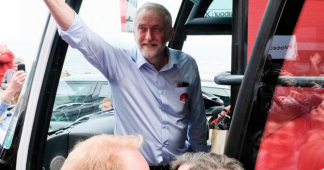You should be too.
By John Nichols
Bernie Sanders traveled to Britain last week, attracting crowds that confirmed that the Vermont senator has emerged as not just the most popular active political figure in the United States but an international phenomenon. It was not Sanders’s intent to intervene in the hastily scheduled and suddenly very exciting British general election campaign that will conclude Thursday. He was in Britain for a brief book tour during a break from his Senate duties and his resistance to Donald Trump’s presidency. But it made sense that the proud democratic socialist who shook up politics in the United States would be asked about the proud democratic socialist who is shaking up politics in the United Kingdom.
Just as Sanders was initially dismissed when he sought the Democratic presidential nod, British parliamentarian Jeremy Corbyn was initially dismissed when he sought the leadership of that country’s opposition Labour Party. Even after he won that leadership contest in 2015, Corbyn was written off as too far left, and too fiercely opposed to austerity, to lead his party in a national election. But Corbyn and his Labor comrades have mounted a potent challenge to British Prime Minister Theresa May and her Conservative Party. May’s Tories retain a lead in the polls as the campaign races toward Thursday’s vote, but several surveys have Corbyn’s team within striking distance of upsetting expectations.
Corbyn’s stronger than expected run on a “For the Many, Not the Few” manifesto—which proposes to tax the rich, reverse privatization schemes, and invest in health care and education—has excited the British left. And it has excited Sanders. “I have been very impressed by the work that Corbyn has done and the campaign that he is running and I wish him the very best,” the senator declared in a speech at the Brighton Festival.
Sanders counseled that he was not in Britain to endorse Corbyn, or to tell voters whom to support in parliamentary elections. But the senator spoke at considerable length about the ways in which the Corbyn campaign had roused him. Sanders told the crowd in Brighton that “I am aware of what Corbyn not only is doing now, but what we has done for the last several years.” That is true; when Corbyn’s left-wing challenge upset the calculus in the 2015 contest for leadership of the Labour Party, Sanders said: “At a time of mass income and wealth inequality throughout the world, I am delighted to see that the British Labour party has elected Jeremy Corbyn as its new leader. We need leadership in every country in the world which tells the billionaire class that they cannot have it all. We need economies that work for working families, not just the people on top.”
That statement earned Sanders criticism from Correct the Record, a Super PAC that supported his opponent, former secretary of sate Hillary Clinton, who would eventually secure the Democratic nod. But the senator from Vermont, who has often cheered on anti-austerity campaigners internationally, kept an eye on Corbyn’s campaigning.
“What has impressed me—and there is a real similarity between what he has done and what I have done—is he has taken on the establishment of the Labour Party and he has gone to the grassroots and he has tried to transform that party and take on a lot of establishment opposition,” he said of Corbyn. “That is exactly what I am trying to do in the US with the Democratic party.”
“I am also impressed by his willingness to talk about class issues,” added Sanders, who explained: “Too many people run away from the grotesque levels of income and wealth inequality that exist in the United States, that exist in the UK, and I believe we will never make the kinds of changes that we needs unless we take on this issue of income and wealth inequality and create an economy that works for all of us.”
Plenty of comparisons have been made between the Sanders and Corbyn campaigns by media outlets in Britain. As Corbyn’s poll numbers were rising last month, The Guardian published a column headlined: “Ridiculed, reviled, resurgent… Is Corbyn’s campaign beginning to #feeltheBern?”
In his speeches and interviews, Sanders went deeper, offering an economic assessment that he said explained the unsettled politics of both the United States and the United Kingdom. “Globalization has left far too many people behind. Workers all over the world are seeing a decline in their standard of living. Unfettered free trade has allowed multinational corporations to enjoy huge profits and make the very rich even richer while workers are sucked into a race for the bottom. These are not American issues, or British issues. These are international issues,” said the senator. “Our job is to create economies that work for working people—that uplift the poor, not make the very richest almost unbelievably rich while leaving everyone else behind. This is a global issue and we must address it.”
